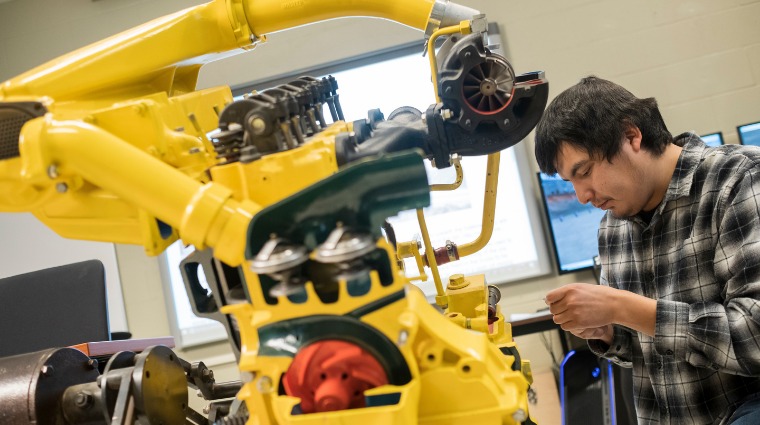
Newcomers acquire language and skills training quickly
December 22, 2020 – In January 2020 Saskatchewan Polytechnic began a special pilot project for newcomers to Canada. This pilot project, funded by Employment and Social Development Canada, provided newcomers with sponsored training for the Parts Person applied certificate and English for employment training.
What makes this pilot project unique is the English training was taught in tandem with the parts management training. “We wanted to see if newcomers to Canada would pick up English quicker if the language training was incorporated into their program training,” says Gerry Youzwa, academic chair for the School of Continuing Education. “The goal of the pilot project was rapid language acquisition along with helping newcomers receive skills training to gain meaningful employment in Saskatchewan.”
This month, 14 newcomers from Venezuela, Sudan, Egypt, Iraq, Syria, India, Thailand and China will complete the Sask Polytech Parts Person pilot, which was a joint collaboration between the School of Transportation, School of Continuing Education and Language Instruction for Newcomers to Canada (LINC). Over the course of the past year students participated in skills training, English language training, a 16-week work placement, essential skills and trade language training and online discussion forums and completed industry recognized safety certifications to complete their applied certificate.
“The pilot was a great success, on average the students’ progressed one-two language levels over the past year,” says Youzwa.
All newcomers in the program are now eligible to register as parts technician apprentices and continue their education training to become certified journeypersons. Most of the newcomers have secured part-time employment and have received job offers for January.
"I'm from China and moved to Canada in July 2019. I was so fortunate to have the chance to participate in this program, which focuses on both language improvement and skills training," says Max Hu, newcomer and Parts Person student. "Now I am a parts specialist at Wheaton GMC Buick Cadillac Ltd which is one of the biggest dealers in Saskatoon. My English is still not perfect, but this program helped me build up the confidence to use English at work. It also taught me the skills I need for the workplace."
“This pilot project was an amazing experience, it helped us build the confidence we needed to talk in English and gain knowledge on the technical words that are used in the Parts Person program,” says Nakary López, newcomer and Parts Person student. “We all enjoyed our time together learning about Canadian culture, language and the parts management trade. My goal is to find a parts management job and start my apprenticeship. I now have more possibilities for a career in Canada to better support my family. Thank you to the instructors, program head and everyone involved in this pilot project, I will never forget your patience and kindness.”
“Everyone involved in the Sask Polytech Parts Person pilot is very proud of the progress made by the newcomers,” says Paul Carter, dean for the School of Continuing Education. “They worked very hard this past year to reach their education and career goals. They received glowing reviews during their work placements. I can’t wait to see what they accomplish next.”
The pilot project was minimally impacted by the COVID-19 pandemic. Newcomers completed their work placement from April-July. In August, students continued their studies online. Students participated in classroom activities using online communications tools. They also had access to interactive content as often and for as long as they needed to master the materials. Faculty monitored progress and offered assistance when they noticed learners having difficulty in a subject area.
Employment and Social Development Canada funded the pilot project for 2020 in New Brunswick, Alberta and Saskatchewan. Additionally, the project received funding from the Government of New Brunswick, Apprenticeship and Occupational Certification, Post-Secondary Education, Training and Labour; Alberta Work Essential Skills; and the Government of Saskatchewan, Ministry of Immigration and Career Training.

